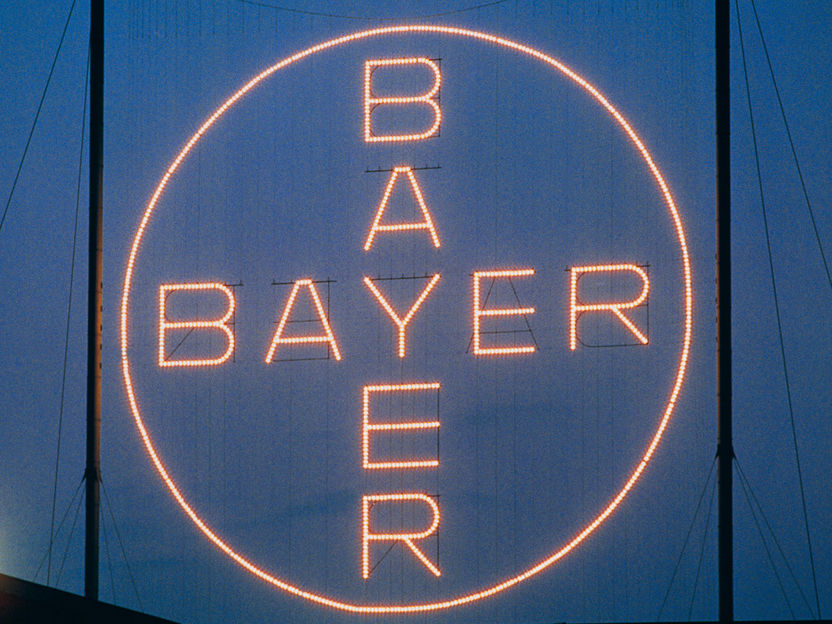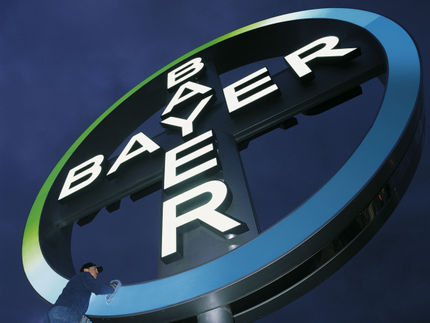Bayer grows sales and earnings significantly
Group sales rise by 14.3 percent (Fx & portfolio adj.) to 9.781 billion euros
The Bayer Group registered a significant increase in sales and earnings in the third quarter of 2021. “We delivered strong operational performance, with all divisions showing strong growth momentum,” said Werner Baumann, Chairman of the Board of Management, on Tuesday when presenting the company’s third-quarter results. Bayer posted substantial growth in the agricultural business, while the Pharmaceuticals Division benefited in particular from large gains for the Eylea™ ophthalmology drug. Business at the Consumer Health Division was up in all regions and product categories. Bayer has also updated the upgraded outlook for 2021 that it had issued in August.

Bayer AG
Group sales in the third quarter of 2021 rose by 14.3 percent on a currency- and portfolio-adjusted basis (Fx & portfolio adj.) to 9.781 billion euros. There was a positive currency effect of 67 million euros. EBITDA before special items increased by 16.4 percent to 2.089 billion euros, and included a negative currency effect of 44 million euros. EBIT came in at 530 million euros (Q3 2020: minus 9.399 billion euros) after net special charges of 694 million euros (Q3 2020: 10.181 billion euros) that primarily related to restructuring measures at all three divisions. Net income amounted to 85 million euros (Q3 2020: minus 2.744 billion euros), while core earnings per share advanced by 29.6 percent to 1.05 euros, mainly due to the development of business within the Crop Science Division.
Free cash flow increased by 58.0 percent to 1.954 billion euros. Net financial debt as of September 30, 2021, decreased to 33.981 billion euros, down 1.1 percent from June 30, 2021.
Crop Science reports strong sales gains and significant earnings growth
In the agricultural business (Crop Science), sales rose by 25.8 percent (Fx & portfolio adj.) to 3.850 billion euros thanks to a substantial increase in volumes and prices. Growth was particularly strong at Corn Seed & Traits (Fx & portfolio adj. 92.6 percent), driven by gains in North America due to lower product returns and the later receipt of license revenues. As expected, these license revenues were recorded in the third quarter this year as opposed to the second quarter as in 2020. Sales also advanced in Latin America due to the launch of the new VTPro4 trait for improved pest control as well as higher volumes and prices. Soybean Seed & Traits also registered strong growth (Fx & portfolio adj. 58.0 percent), driven by gains in North America – due to lower product returns and higher license revenues – and in Latin America as a result of higher prices and volumes. Herbicides also posted a substantial increase in sales (Fx & portfolio adj. 15.2 percent), with the business recording encouraging gains in North America and Europe/Middle East/Africa, mainly due to an increase in prices for glyphosate-based products and higher volumes.
EBITDA before special items at Crop Science rose to 471 million euros (Q3 2020: minus 34 million euros), resulting in a margin of 12.2 percent. The improvement in earnings was mainly attributable to higher prices and volumes, an increase in license revenues, and contributions from ongoing efficiency programs. By contrast, earnings were diminished in particular by an increase in the cost of goods sold.
Pharmaceuticals reports higher sales – new products provide boost
Sales of prescription medicines (Pharmaceuticals) rose by 7.1 percent (Fx & portfolio adj.) to 4.539 billion euros. The division’s ophthalmology business was able to grow market share and continued to recover following the COVID-19 restrictions, especially in Europe. As a result, sales of Eylea™ advanced by 19.0 percent (Fx & portfolio adj.). Sales of the oral anticoagulant Xarelto™ increased by 4.3 percent (Fx & portfolio adj.), with substantial volume growth in Russia and Germany in particular offsetting a price-related decline in China. Sales of Adalat™, one of the company’s products for the treatment of heart disease, rose by 24.2 percent (Fx & portfolio adj.) thanks to higher volumes in China. An increase in volumes in the United States resulted in sales gains for the pulmonary hypertension product Adempas™ (Fx & portfolio adj. 21.0 percent). Sales of Nubeqa™ rose significantly, driven by the cancer drug’s successful launch in the United States, which is currently ongoing. In addition, Bayer initiated the market launch of Kerendia™, its product for the treatment of patients with chronic kidney disease and type 2 diabetes, in the United States. By contrast, sales of the cancer drug Nexavar™ declined against the prior-year period (Fx & portfolio adj. 27.8 percent), particularly in China, where business was negatively impacted by strong competition and modified tender procedures for various classes of active ingredients.
EBITDA before special items at Pharmaceuticals decreased by 9.8 percent to 1.366 billion euros, resulting in a margin of 30.1 percent. Earnings were diminished by an increase in marketing costs, which was largely attributable to the launch of Kerendia™ and Nubeqa™, and by a rise in research and development expenses, which was partly related to the division’s cell and gene therapy unit.
Consumer Health continues to grow and increases earnings
Sales of self-care products (Consumer Health) came in at 1.346 billion euros, up 10.9 percent (Fx & portfolio adj.) against a very strong prior-year quarter, with growth in all regions and categories. Business primarily benefited from continued high demand in Nutritionals, which saw sales rise 20.1 percent (Fx & portfolio adj.), and the launch of innovative products in all categories throughout the year. The Pain & Cardio category also registered particularly strong growth of 17.4 percent (Fx & portfolio adj.)
EBITDA before special items at Consumer Health increased by 2.3 percent to 308 million euros, resulting in a margin of 22.9 percent. The growth in earnings was driven by the division’s strong business performance and continuous cost management efforts. This was partially offset by investments associated with the launch of innovative products and by inflation-related increases in costs.
Updated outlook
Following the very good business performance in the third quarter, Bayer has revised the upgraded outlook for 2021 that it issued in August. On a currency-adjusted basis (i.e. based on the average monthly exchange rates from 2020), the company continues to expect sales to come in at approximately 44 billion euros. This now corresponds to currency- and portfolio-adjusted growth of approximately 7 percent (previously: approximately 6 percent). The forecast for the currency-adjusted EBITDA margin before special items remains unchanged at around 26 percent. Core earnings per share are now expected to come in at approximately 6.50 euros to 6.70 euros after adjusting for currency effects (previously: approximately 6.40 euros to 6.60 euros). Free cash flow is now anticipated to amount to between approximately minus 0.5 billion euros and minus 1.5 billion euros (previously: between approximately minus 2 billion euros and minus 3 billion euros) as a portion of the settlement payments for the glyphosate litigations are now expected to be made in 2022 instead of 2021. In addition, Bayer is now anticipating net financial debt of around 35.5 billion euros (previously: around 36 billion euros) at the end of the year after adjusting for currency effects.
Based on the closing exchange rates on September 30, 2021, the company continues to expect full-year sales to come in at approximately 43 billion euros. This now corresponds to currency- and portfolio-adjusted sales growth of approximately 7 percent (previously: approximately 6 percent). The EBITDA margin before special items is now expected to amount to approximately 25.5 percent (previously: approximately 25 percent). The company is now anticipating core earnings per share of approximately 6.10 euros to 6.30 euros (previously: approximately 6.00 euros to 6.20 euros). Free cash flow is now expected to come in at between approximately minus 0.5 billion euros and minus 1.5 billion euros (previously: between approximately minus 2 billion euros and minus 3 billion euros). The company’s forecast for net financial debt remains unchanged at around 35 billion euros.
“New technologies vitally important for health and nutrition”
“Our third-quarter performance shows that we are very much on the right track – both in terms of operational development and the market launch of new products,” said Baumann, underlining Bayer’s strength in delivering innovations. “We have aligned our corporate strategy and our innovation potential toward health and nutrition, which are areas of systemic importance. In doing so, we are looking to help solve a question of fundamental importance: How do we feed and satisfy the health needs of a growing population in the face of climate change?"
New technologies are vitally important in this respect, he explained. Together with its partners, the company is working on numerous projects involving technologies that can really make a difference for society. For example, Bayer is working on two novel therapeutic approaches for Parkinson’s, a nervous system disorder for which there is currently no cure. Via its Leaps unit, the company has also invested in three biotech start-ups that are harnessing various technologies in their research on microbial engineering, potentially paving the way for more crops to fertilize themselves in the future. This would be great news for the climate, as it would enable farmers to bypass nitrogen fertilizers, which are used to grow around 40 percent of the world’s food but also account for roughly 4 percent of all greenhouse gas emissions worldwide.
Sustainability: Three-fold increase in volume of renewable energy sourced via supply agreements
Bayer is also working intensively on its ambitious sustainability targets, with the company committed to becoming carbon neutral in its own production operations by 2030. In addition to investing in more energy-efficient facilities and building technologies, it is also extensively harnessing renewable energy sources. As of the end of the third quarter, Bayer has this year concluded agreements covering around 400,000 megawatt-hours of green energy, representing a three-fold increase in volume.
Reinforcing its commitment to improve access to family planning, especially in low- and middle-income countries, the company recently initiated the construction of a new production site in Costa Rica and the expansion of an existing facility in Finland. Both sites are set to produce long-acting reversible contraceptives in the future. These investments are a milestone as the company works toward meeting its sustainability target of providing 100 million women with access to modern family planning by 2030.




















































